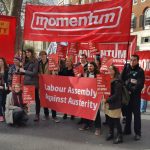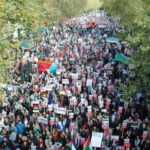FOLLOWING THE 2017 LABOUR PARTY CONFERENCE: FORWARD TO A MEMBERS-LED LABOUR PARTY – Rise like Lions after slumber – In unvanquishable number – Shake your chains to earth like dew – Which in sleep had fallen on you –
Ye are many – they are few.” Shelley, 16.8.1819
At the 29 Sept 2017 Labour Party Conference, the 1,200 delegates made clear their support for J Corbyn and his defense of the Palestinian cause. They did this through rounds of applause and standing ovations. Outside, the bourgeois Daily Mail was warning against “an outbreak of intimidation and anti-Semitism at its [this] annual Conference” [2].
At each Labour Conference, nothing less is expected from the delegates than their endorsement of the Party’s line “in its entirety”. Party policy is not just determined by J Corbyn; it is also determined by the Party’s structure, whose aim is to ameliorate capitalism. This is why Party policy is always protective of capitalism and opposed to socialist transformation. In this Conference however, and further to previous victories, the delegates succeeded in making the NPF [3] withdraw the sections of its policy documents too tolerant of privatisation [4]. For the first time in years, this Conference refused to ‘swallow’ the NPF line “in its entirety”. This was not “an outbreak of intimidation” at all, as the capitalist press reported; it was but members showing that they are grown up people who want to shape their political life, their Labour Party and their Conferences.
Although the delegates could not insert their own views in the NPF documents, they succeeded in making their leaders withdraw policies too soft with ‘neoliberalism’. Isn’t it despotic to demand of Party members that they endorse the Party line “in its entirety”? Doesn’t this cultivate subservience and servility? Isn’t this why the Party keeps the Socialists, J Corbyn and the striking workers at arms’ length? Is this what it costs to try and ameliorate capitalism? The ordinary Labour members answer these questions by confirming J Corbyn in the Party’s leadership. And J Corbyn himself answers with the Labour Manifesto [5]. The latter is not an anti-capitalist programme, but it challenges capitalist power. Considering the fear and hatred which it inspires in the ruling class, this Manifesto is going to need the solid backing of a members-led Labour Party [6].
The membership challenges it oppression :
In this Conference, the Party’s leadership had to listen to the delegates. It is certainly a fact that, before the Conference, the Party’s organisers themselves had decided to give more time to hear the delegates’ speeches. This shows a move of the leaders towards the members, and not just a battle of wills. This comes greatly from J Corbyn’s ability to discuss and convince [7], as well as from his success in drawing and raising militant workers up into the Party. The delegates were brave in this Conference, but they were served also by a new balance of forces created previously by J Corbyn and his supporters.
The capitalist system sinks into corruption and incompetence. Far from enlarging its imperialist capabilities, its wars for ‘regime change’ have only driven it closer to world war. Meanwhile, Grenfell [24] highlighted how capitalism is prepared to let people die, so that it (capitalism) can continue to profit and exist. A few people in society are killing ‘the many’ by destroying the public services for instance. Witnessing this, people become convinced that they must intervene. They see the need to take command and control of social organisation. Because the Labour Manifesto addresses this question, it has an enormous authority in the country and in the Party. The way the Party has transformed in only two years, measures the speed of the preparation taking place in the working class and its allies. In depth, this is what forced the NPF to concede. There is no doubt also that, through this kind of concession, the NPF hopes to retake control and keep its power.
When in 2011 the LCFs [8] replaced the Local Government Committees (a top-down change) [9], the Party as a whole increased its dependency on Regional Party structures themselves conniving with capitalist and speculative power structures in the localities. This is how the Labour-controlled local authorities – throughout the country and for many years – sold much of the publicly owned lands and assets to the private sector. It is only now, as in the case of Haringey (London), that the Party seems to wake up to the challenge.
In the Parliamentary, conservative and pro-bourgeois circles of the Party, connivence with capitalism demands a corresponding clearance of anti-capitalist Party members. This is why purges against the Party’s left have always existed. And then, from Blair onwards, the Party stopped attracting the left. It gained bourgeois votes but lost much of the working class. Around 2010, as austerity started to bite, the left fought back in the Party – and expulsions increased. Now, that J Corbyn draws to the Party thousands of leftwing members, the Party rejects them. Yet more expulsions. It is the bourgeois structure of the Party that wants ‘out’ with the Corbynists [10].
What changed with J Corbyn is the forceful entry in the Party of thousands of workers (and allies of the workers) already involved in hundreds of anti-austerity struggles in communities, amongst tenants, the unemployed, the disabled, the chronically sick, the strikes, the workers and the Trade Unions. In its turn, the growth of the left which the Party’s structure can no longer dissuade, plays the role of encouraging the working class in its anti-exploitation and anti-austerity determination. The Corbyn Labour Manifesto summarises this. It defends the public sector, the public assets, the public interests and the public good. The general population sees that the Labour Party is calling it. The Manifesto resonates in the population. It won votes in the general election.
The suppression of the Local Government Committees had been part of a wider policy of suppression of the Party’s militant base. Instead of giving up this time, that base increased its coordination with the anti-austerity and anti-capitalist forces outside the Party. The Peoples Assemblies belong to those forces. They draw more on educated petit bourgeois people, intellectuals and academics. One of the reasons sometimes used by the NCC [11] to suspend a Party member is that this person “supports” an organisation outside Labour. But this repression is pathetically ineffectual. In the Conference, the delegates demonstrated that they learn politically from all around them, and demonstrably not from their leaders! In terms of intellectual honesty, political knowledge and social experience, they (delegates) are streets ahead of their leaders. The latter have no political preparation. They confiscate documents, avoid debates, force compliance and produce no newspaper.
In August 2016, the Procedures Committee of the National Executive Committee (NEC) resorted to the capitalist courts to stop between 126,000 and 150,000 newly signed-up members becoming eligible to vote [12]. The idea was to repel this pro-Corbyn cohort, and to cause it to leave. Many new members stayed however, and the Momentum [13] organisations – that had started in 2015 – continued to grow. This Conference has illustrated and reinforced this trend. It has confirmed that the allies of J Corbyn are going forward, and that those who oppose the public good must give way.
The above-mentioned retreat of the NPF showed, above all, the growing determination of the Party members to make their mark in the Party. The members want to shape their Conference. They want to own their politics. Their conduct is indicative of a quest for a “members-led” Party – a formulation that was born in Momentum itself. This Party Conference not only confirmed the leftwards inclination of the Party, it increased it. This strengthens J Corbyn and the persuasive power of the Manifesto [14]. Mind that another Manifesto is being prepared, this time with more input from the Party’s base.
The economic transformation proposed in the Labour Manifesto (the present one) tends already towards the reorganisation of the economy: To produce what people need. To produce not necessarily for exports, or not necessarily for investors to make their money. This growing confidence in the Party’s members and in the Corbyn leadership crowns years of previous victories. You have an example in the right – won during the 2016 Labour Conference – to adopt the NPF’s policy documents “only in parts”. In the past, the Executive used to reserve for itself the right to void a Conference and declare the Party without policy! This never happened, but it was a blackmail.
J Corbyn and his socially superior Manifesto open the Party up to views (and programmes) compatible with social or socialist transformations. These views grow in authority even in the upper spheres of the Party, as shown by the election of several new Corbyn supporters to the NEC. Above all, these views grow in the Party’s base, as shown when pro-Corbyn Len McCluskey [15] of the Trade Union Unite Community received a standing ovation from the delegates. This proves the rising authority of the Trade Unions in the Party, and the spread of Corbyn’s ideas in the working class. This goes so deep now that it cannot be reversed [16] without a violent attack on the part of capitalism – something that the latter does not have social authority to win.
http://www.unitetheunion.org/growing-our-union/communitymembership/
Momentum’s progressive role :

Momentum is an organization at the base of the Labour Party and Trade Unions. It grew over time from the constant strikes, demonstrations, mobilizations and protests against austerity, as well as from the public’s anger at social inequality gone mad. In this Conference, Momentum, CLPD [17] and others helped the delegates to act as a united force. This stopped right-wing MPs like Chuka Umumna and Alison McGovern insisting on a Brexit debate [18] to stop more anti-capitalist debates. When one delegate went to the rostrum to explain this, the ovation he received showed that the delegates had already understood; and that Momentum had unified the delegates, and not manipulated them [19].
The partial retreat of the NPF in this Conference is only one aspect of the massive political change brought to the Party by J Corbyn. The pro-imperialist Labour layers who oppose him virulently tend to gather around the parliamentary Party, the MPs, the MEPs [20] and their European parliamentary networks. In the localities, the Labour MPs operate through circles of acolytes with concrete personal, material and business interests. In keeping with the Party’s aim of simply ameliorating capitalism, the Labour-controlled Local Councils insist on their right to ameliorate capitalist austerity [21]. Aspects of feudality seem to grow in the local Labour parties, perhaps in keeping with the deepening degeneration of capitalism. However, it is also in the localities that the Labour members come together and organize Momentum groups. This helps them break free from their confinement in atomized – not to say atrophied – local Labour structures.
The perpetuation of venomous anti-Corbyn sectors in the Labour Party depends on capitalism being able to survive and provide them with jobs. Sensing the terrible decline of capitalism, these sectors want to stop the Party changing, society changing, and themselves having to face change. They accept that J Corbyn is a humane man. Many of them are not capitalists – they depend on capitalism. They are terrified of the change that is coming, but not all of them now support the US policy of ‘regime change’. The advent of Trump in the Whitehouse makes them even more insecure. Seeing world capitalism tumbling from failure to failure, they get less antagonistic towards change. Apart from the small layers of direct or indirect imperialist agents in the Party, the anti-Corbyn sectors find it increasingly difficult to support Israel unconditionally. They want to meet capitalist austerity half-way, but there is no such half-way. In this Conference, the confidence of the Party’s base forced some of them rightwards [22] but it forced many more of them leftwards [23]. The tragedy at Grenfell [24] demonstrated to perfection that in capitalist society, “the few” will make their profits even if “the many” must die. This cuts the ground from under the right-wing. The pro-bourgeois and pro-imperialist sectors of the Labour Party are in a cul-de-sac. They lose social authority and social support.
It is to hold back the socialist transformation of the Party, and of the country, that top Party leaders act like Party owners. Denying to the members any ownership of the Party, they surrender them (members) to the capitalist media, to the capitalist courts of law, and to the State’s police.[25] These top leaders use expulsions and suspensions to tame and intimidate the remaining members. But this fails too. In this Conference, those intimidated were the NPF’s leaders. This is part of what Momentum helps to achieve. This is the progressive role that Momentum plays at this time.
The return of the confiscated pro-Palestinian Chapter :
In the Labour Manifesto [26] – which is now Party policy – J Corbyn included a chapter on Palestine calling for “an end to the Israeli blockade, occupation and settlements”. This chapter was removed from the pre-Conference documents, and then it was discreetly returned to the documents when the Conference started. Evidently pro-Israel executives had tried, and failed, to suppress this particular part of the Manifesto.
This incident gives a measure of the forces that confront each other in the Party, regarding Israel and Palestine. The confiscation of documents is not a new method of the Party’s apparatus. In this case, it shows a lamentable level of almost childish superficiality and political incompetence. What it shows also is the growing authority of J Corbyn’s arguments where he condemns the imperialist roles of Israel, of the United States and of Britain. The return of this document was a political victory for J Corbyn and the Palestinian cause.
The significance of this victory grew more obvious when the Head of the Dispute Panel [27] – the centrist Ann Black – was replaced by Momentum-backed Christine Shawcroft [28]. This event, itself the result of previous similar advances, weakens the ability of the Zionist groupings in the Party (like the JLM [29]) to plot (with future NECs) against Conference resolutions, Conference documents and what left-wing Party members to be expelled [30].
The return of the chapter proved that even the old NEC, then more to the right than now, did not accept that it is “anti-Semitic” to call for “an end to the Israeli blockade, occupation and settlements”. This, and the huge support for the Palestinians in this Conference, forms part of the determination of the members to see to human justice, and to own their Party.
In the period following the Conference, the crisis of the right wing Party sectors was confirmed by the reinstatement of the anti-Zionist Labour member Moshe Machover [31]. The latter had been “automatically” [32] expelled for “anti-Seminism” [33] less than one month before, A huge campaign in his defence had grown very rapidly in the Party, in the country and internationally. If Moshe’s international support played a large role in his reinstatement, it is because the intelligence of the world watches the progress taking place in the Labour Party. It supports J Corbyn and the success of his supporters. J Corbyn has an international appeal and authority, due particularly to his pro-Palestinian stance.
The democratic transformation of Labour has the Palestinian cause at its core :

Support for the Palestinians is growing in the Labour Party, as in the country. This has led to the formation of the JVL [34]. The reinstatement of Moshe – with no explanations or apologies – shows the arrogance, the disdain and the unprincipled superficiality that reign in the Party’s upper spheres. It also shows the disputes there, and the failure of those who would ride roughshod over the Party and its working class base. Moshe’s arbitrary reinstatement proves that the accusation of ‘anti-Semitism’ against him was phoney. The support for him in the Party and the Trade Unions [35] shows the depth of political sophistication developing in the working class. It shows what mountains could be moved if the Labour Party cultivated intellectual honesty and scientific thought.
As the delegates to this Conference rejected the faint-hearted parts of the NPF’s document, they opened several doors. They ended the practice of the Executive forcing itself on the Conference with impunity. Incidentally, past experience shows that those keenest to impose themselves in this way have always been the loudest critics of Mr Stalin.
In this Conference, the delegates also opened the door to J Corbyn feeling more prepared to break with capitalism. If they wanted democracy in the Conference, it was not just to defend their right to speak, but to defend the right to create a Party disposed to campaign for social change with the Manifesto in hand. This is not at all the case presently. Presently, most deputies (MPs) campaign for themselves, in their own name, using the Labour label. The day will come when this will be considered an act of theft.
The Party members want justice in the world and justice in Britain; hence they want the right to turn their Party into an instrument that defends justice. Contrary to what the capitalist press reports, the membership does not follow Momentum blindly. The membership is the originator of all ideas. This is why the Corbyn leadership wants it constantly more involved and consulted. In the Conference, the membership found the strength (through the delegates) to make the half-hearted Labour leaders [36] pay some respect to this.
The conditions exist for the Party’s membership to take more control of its Conferences. This is not likely to happen at once, because it is a process; but in this Conference, the NPF lost one of its rights to arbitrary power. One day, the working class will impose that Party policy is determined solely at Conference. This Conference gave a hint that this is where the Party is going. It is instructive that the bourgeois class saw in this development “an outbreak of intimidation”. The capitalists and their anti-Corbyn allies view as totalitarian the eventuality of Corbyn supporters being elected (by the ordinary members of course) to leading Party positions. In their view, democracy equals anti-Corbynism.
The anti-Corbyn layers in the Party failed to impose on this Conference their stale and subservient NPF documents “in their entirety”. Having no social support and no logical political arguments, those who intend to stay bound to profit making, competition, markets and war – are bound to fail. This only serves to enrich the already insanely rich “few”. The “many” are knocking on the door. It is the role of Labour to let them enter.
In the coming local elections, the Labour councillors will only collect votes [37] if they support the Labour Manifesto and J Corbyn. What wins votes is not the ‘Labour’ label, but the anti-austerity and the pro-socialist projects of the Corbyn leadership. The same goes for the MPs, should a general election be called.
Towards a members-led Party :
The Labour leaders will win votes if they join their members in support of the Manifesto, around J Corbyn and around Momentum. Their own individual names cannot compete with that of J Corbyn, particularly in local elections. Meantime, the conditions exist for Labour to attract votes through more resolute anti-austerity and anti-capitalist demands, in support of all the struggling sectors of the population.
The strength of J Corbyn and the political debility of his opponents favour a more systematic, and more political organization of the Left in the Party: With broadsheets, Party participation in the struggles, political meetings and appeals to the population. In this coming period, let us campaign for:
- Full support to the pro-Corbyn councillors, and the councillors in Labour ‘marginals’.
- Mass Labour, Momentum and Union meetings to demand a members-led Labour Party.
- Mass Labour Party meetings to organise with StopTheWar, the Peoples Assemblies, Momentum and others, against another world war.
- An anti-war Conference of all European workers parties and Trade Unions (and their allies).
- A British economy geared to human need.
- The scrapping of Trident and opposition to Nato.
- A Republican Britain and the Socialist Federation of the British Isles.
5.2.2018
[1] This document aims not only at Labour Party members but at others who may not know the UK in detail. Hence the many foot-notes.
[2] In the Daily Mail, 26.9.17, in an article called: “Labour, the Real Nasty Party”
[3] NPF: National Policy Forum, organ that sets out official Party policy for the year ahead.
[4] The NPF only wanted to stop the “excess profits” being made by privateers in the public sectors of Education and Health.
[5] The title of the Manifesto is: “For the Many, Not the Few”. This phrase derives from Percy Shelley’s: “The Masque of Anarchy” – a poem in 91 verses he wrote in 1819, and that was banned for the following 30 years. http://www.peterloomassacre.org/shelley.html – A new Labour Manifesto is being created for 2018, with much more consultations with the membership.
[6] Although Corbyn’s proposals are very moderate compared with Tony Benn, the capitalists fear him more because their system cannot compete now (economically, politically and culturally) with any move on the left.
[7] When he launched his election campaign on 9.5.2017 from a ‘battle bus’, Jeremy Corbyn said: “Our political system is broken and our economy is rigged”.
[8] LCF: Local Campaign Forums. They help select Labour candidates. They tend to be dominated by electorally-minded regional apparatuses hostile to socialist ideas.
[9] Under the cover of a Miliband Refounding Labour Agenda that re-founded very little.
[10] Ken Livingstone was suspended in 2016. Jackie Walker is still suspended. Tony Greenstein was expelled 18.2.18. Countless others are kept out of the Party; there are no official figures. Entire parties have been accused of malfeasance and put under special measures, with no explanations. Persons are returned to the Party without apologies.
[11] A disciplinary body in the Party.
[12] That was in the second Labour leadership campaign – to try and oust J Corbyn.
[13] Momentum emerged in the Labour and Trade Union base during the Corbyn campaign to win, and retain, the Party’s leadership. It has now more than 23,000 members, 200,000 supporters and 150 local groups. They demand “a fair and equal society”.
[14] The Manifesto plans some nationalisations, cooperatives , production for need and social participation. It recommends sharing and steps to be taken against the predation of the private interests (European campaigns against tax evasion and avoidance for instance).
[15] General Secretary of Unite. This Trade Union organizes strong anti-austerity campaigns.
[16] In the present conditions, any direct capitalist violence will create revolutionaries, not social-democrats.
[17] CLPD: Campaign for Democracy in the Labour Party.
[18] Brexit was debated anyway later, and in another form.
[19] The bourgeois press reported that Momentum was manipulating the naïve Corbyn’s supporters in the Conference.
[20] MP: Member of Parliament (a Deputy). MEP: Member of the European Parliament.
[21] They see their left-wing critics as rebels and opponents of “local Party democracy”.
[22] Like Tony Blair, Peter Mandelson, Roy Hattersley, etc. Often aristocrats.
[23] This is the case with most shadow ministers now serving Corbyn.
[24] The fire at the Housing Tower in Kensington and Chelsea, June 2017.
[25] This happened when Walter Wolfgang was expelled from the 2005 Conference and handed over to police who investigated him under the Anti-Terror Laws. (Re: Jack Straw over Iraq).
[26] “For the many, not the few”, as we have seen.
[27] This Panel has a large say in the Party’s purges.
[28] Christine Shawcroft won by 22 to 15. This margin shows a political elevation, not just a numerical one.
[29] JLM: Jewish Labour Movement, affiliated to Labour: With the old NEC, this organization concocted a pre-Conference document aimed at more drastic expulsions from the Party.
[30] That organization uses the battering ram of ‘anti-semitism’ – not to defend Israel so much as to get the anti-imperialist Labour Left expelled. The Party’s apparatus connives with this in its anxiety to preserve Labour as the Loyal Party of capitalism.
[31] Moshe Machover has dual citizenship: Israeli and British. He is an eminent Palestine-born professor of philosophy, a mathematician and a world-famed defender of the Palestinian cause.
[32] ‘Automatic expulsion’ (or ‘auto-expulsion’) means no appeal allowed.
[33] Read: “Anti-Zionism does not equal anti-Semitism”, Moshe Machover, in Labour Party Marxists No. 17, 21.9.2017.
[34] JVL: Jewish Voice for Labour. Started in the margins of the Conference. Was supported by at least two major Trade Unions. JVL supports J Corbyn. It defends the Party members falsely accused and disciplined. It helps educate the Party politically, something absent from the Party, which has no press and does not want members to read the press of the Left.
[35] Trade Unions supported Moshe, helping him to win his re-instatement.
[36] See Alex Nunns, “The Labour Conference that the media failed to report”, 2.10.17, in Red Pepper.
[37] Local elections in England. Considering Tory weakness, a general election is also likely.













